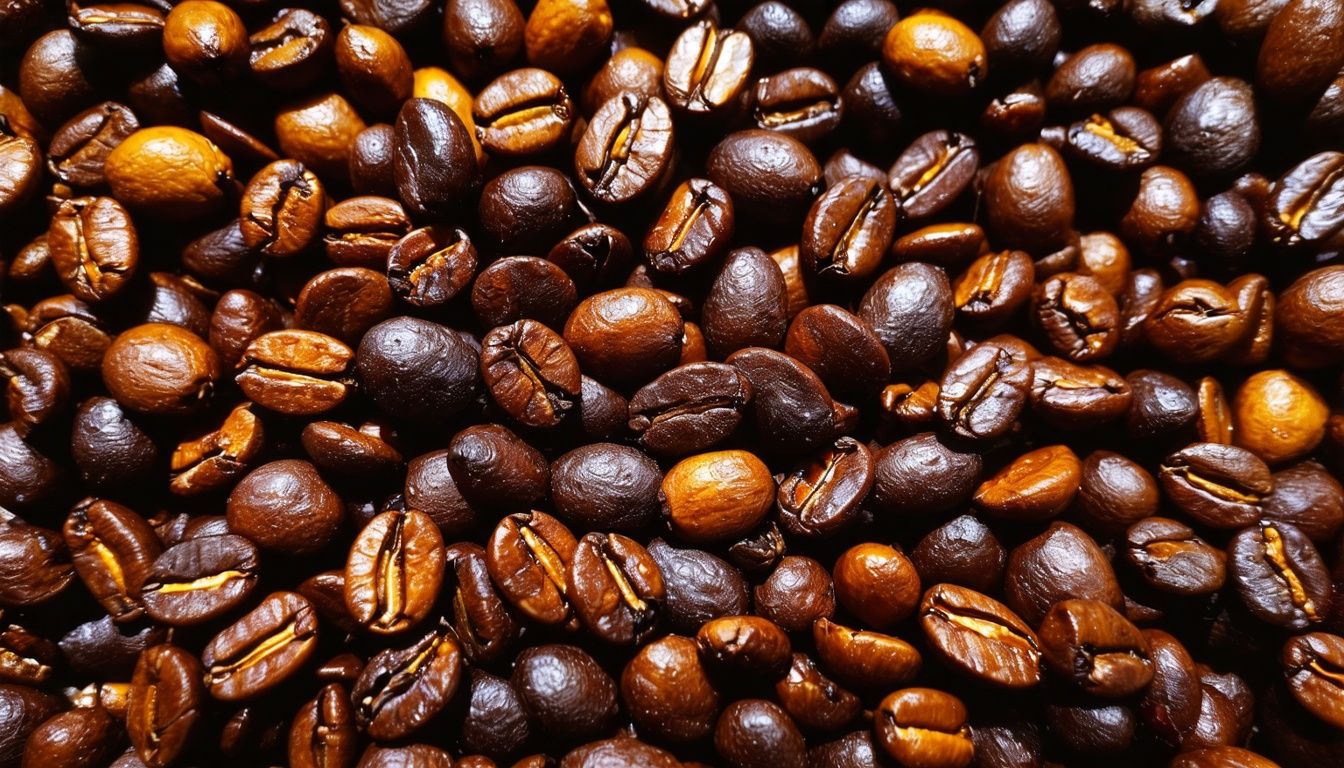Blog
Honduras Coffee Beans: The Finest Coffee
Yearning for a distinct brew? You could be pondering where to source beans that are extraordinary. Look towards Honduran coffee beans. The appeal of these beans lies in their origin – Honduras, a location boasting the ideal climate and soil conditions for cultivating delectable coffee.
Honduras contributes more than 350,000 metric tons of coffee annually. This places it among the top six coffee producers globally, indicating the significance of its coffee on an international scale.
In this article, you’ll gather knowledge on why Honduran coffee beans are some of the most reputable coffees available.
You’ll gain insights into what sets these beans apart, and how they’re cultivated and processed by farmers in Honduras who prioritise superior quality and ethical practices. Set to brew?
What Makes Honduran Coffee Beans Special?
Honduran coffee beans stand out because of their unique place of growth. The country’s mix of high mountains and rich soil gives these beans a distinct taste.
Geography and Climate of Honduras
Honduras presents a diverse range of landscapes and weather conditions ideally suited to coffee cultivation. The terrain, interspersed with mountains and valleys, forms perfect homes for coffee plants situated at heights of 1,100 to 1,700 metres.
The elevated position lends to a slower growth rate for the beans, implying augmented flavour concentration.
The climate in Honduras demonstrates variations across different areas but generally provides what is favourable for coffee plants: abundant rainfall and warm temperatures without becoming excessive.
These environmental factors contribute to the beans’ proper development, resulting in an expansive taste variety in the final brew. From Copán to Agalta, each region imparts a unique character to the coffee owing to these geographical and climatic attributes.
Coffee Varieties Grown in Honduras
In Honduras, farmers grow unique coffee types. These include Catuai, Lempira, and IHCAFE90. Each has its own taste that makes Honduran coffee stand out. For example, SHG coffee grows at high places where the air is cooler.
This helps the fruit grow slowly. As a result, the beans are denser and sweeter.
These coffees offer flavors like nutmeg, chocolate, and toffee. The natural way of preparing them keeps their special tastes strong. So when you drink a cup of Honduran coffee, these are the tastes you’ll enjoy.

How Are Honduran Coffee Beans Cultivated and Processed?
Farmers in Honduras grow coffee beans with care and tradition. They pick the beans by hand, then dry them in the sun or machines to bring out their best taste.
Traditional Farming Practices
Honduran agriculturists cultivate coffee with traditional methods. They stay true to techniques inherited over various generations. These techniques comprise developing under shade and cherry collection by hand.
The plantations are typically nestled amidst highland terrains, offering optimal conditions for Arabica types such as PACAS and LEMPIRA.
These agriculturists also dedicate attention to ethical trading and organic methods. This implies that they utilise natural fertilisers in place of chemicals. In adopting such actions, they safeguard the environment and sustain the delivery of top-quality beans for your brew.
It’s the meticulous steps from cultivation to roasting that render Honduran coffee distinct.
Processing Methods Used
Farmers in Honduras use a method called wet-processing for their coffee beans. This means they remove the outer cases of the beans with water before they dry them. They do this at places called washing stations.
Here, they also check the quality of the coffee based on how high up it grew. The higher, the better quality it is considered.
This wet-processing makes the flavour of Honduran coffee better but costs more money to do. So when you buy this kind of coffee, you are getting something special that took extra care to make.

Which Regions in Honduras Produce the Best Coffee Beans?
In Honduras, certain areas stand out for their exceptional coffee beans. Copán, Montecillos, and Agalta are key players in the game, each offering unique flavors that set them apart.
Copán Region
The region of Copán in Honduras is renowned for its exceptional coffee production. The ideal combination of mountainous terrain and cooler climate contributes to the cultivation of varieties such as Bourbon, Caturra, and Catuaí.
The distinctive flavours from this region embody notes of caramel, chocolate, along with a slight hint of sweet smoke. The coffee receives high praise from consumers, averaging a rating of 4.85 out of a possible 5 stars.
You can purchase these beans in diverse quantities for only £8.50. The admirable aspect of the farming practices here is their commitment to sustainability and earth-friendly packaging.
Montecillos Region
Montecillos Region stands out in Honduras for its coffee. This area is high up, between 1200 and 1600 meters above sea level. It gets a lot of rain each year, from 1300 to 2300 mm.
These conditions are perfect for growing coffee.
Farmers in Montecillos grow mainly Lempira and Pacas types of coffee. When you drink it, you might taste orange or peach. It has a lively acidity and a smooth feel. They pick the coffee beans from December to April.
The beans go through a washing process before they become the coffee you enjoy.
Agalta Region
The Agalta Region in Honduras is famous for its coffee. This area has high mountains and fertile soil. These conditions are perfect for growing high-quality coffee beans. Coffee from Agalta tastes amazing because of this.
Farmers in Agalta work hard to grow and pick the coffee by hand. They use old methods that protect the land. After picking, they dry the beans in the sun. People around the world love Agalta coffee for its taste and quality.
What Are the Flavour Profiles of Honduran Coffee?
Honduran coffee tastes rich and full. You might find hints of sweet fruits, spices, or even chocolate when you drink it.
Tasting Notes
Honduran coffee surprises you with its fruity aroma and a hint of citrus flavour. You’ll find the medium body pairs well with soft acidity, making each cup smooth. Arabica varieties like Catuaí, Caturra, Pacas, and Bourbon are common.
These beans grow above 1350 metres in places like La Paz and Marcala. When you try it, look for notes of orange and a velvety taste that stands out.
This coffee’s special flavours come from high-altitude areas where farmers take care to produce quality beans. The mix of geography and careful farming means you get a fresh, aromatic drink every time.
Each sip offers something new – whether it’s the fruitiness or the subtle spice undertones that many love about specialty coffees from Central America.
Factors Influencing Flavour
The flavour of Honduran coffee is influenced by its growth location and conditions. High altitude locales, where temperatures are cooler and growth slows, can make the beans denser and result in a richer flavour.
Locations such as Copán and Montecillos offer ideal growth conditions. The combined effects of rainfall, altitude, and temperature changes contribute distinct tastes.
The coffee plant type also plays a part in taste differentiation. Arabica varieties, prevalent in Honduras, tend to produce a smoother, sweeter brew than other varieties. Post-harvest bean processing methods, such as washed or sun-dried, can also affect flavour, possibly emphasising fruity or chocolate-like notes in the final drink.
Therefore, each stage from planting to brewing influences the delightful taste of your coffee.

Why Should You Choose Honduran Coffee Beans?
Honduran coffee beans stand out for their premium quality and strict certifications. They support sustainable farming, making them a good pick for the planet.
Quality and Certifications
Honduran coffee beans stand out for their high quality. They score 84.5 on the Specialty Coffee Association scale. This means they are top-grade beans. The beans come with Organic, Fairtrade, and Rainforest Alliance certifications.
These labels guarantee that the coffee is grown using methods good for both the earth and its people.
Farmers in Honduras use traditional ways to grow coffee. They also focus on keeping things sustainable. This care from start to finish makes sure you get fresh, unopened coffee that lasts up to nine months and tea up to twelve months.
Choosing Honduran coffee supports both ethical farming practices and superior taste in your cup of speciality blend or single-origin espresso.
Sustainability and Ethical Practices
Farmers in Honduras grow coffee under shade trees. This helps stop soil from washing away and gives homes to many animals. They also grow types of coffee that don’t get sick easily from rust, a plant disease.
You buy fair trade coffee from Honduras, you know farmers get a good pay for their work. This supports the whole community.
By picking these beans, you back farms that care about our planet. They plant trees and use safe ways to farm, which is better for Earth. Next time you enjoy a cup of Honduran coffee, think about the good it does—not just for your taste buds but also for the world.

Where Can You Purchase Honduran Coffee Beans?
You can buy Honduran coffee beans from local shops and online. Both places offer a variety of beans for your coffee needs.
Local Retailers and Cafés
Local retailers and cafes are ideal places to acquire Honduran coffee beans. They frequently replenish their stocks. Various grind sizes and types are available to suit your brewing technique, be it for a cafetiere or an AeroPress.
These establishments promote fair trade and source their supplies straight from the farmers.
York Coffee Emporium is an example of a retailer where you can purchase premium Honduran SHG coffee. This guarantees a fair return for the farmers’ diligent work. Choosing these retailers means you are not just relishing the exquisite coffee but also aiding distant communities.
Online Stores and Marketplaces
You have the option to purchase Honduran coffee beans online, with prices commencing at €7.95 for 200g. These digital platforms present a diverse range of delivery methods, such as Royal Mail and DPD.
There also may be an opportunity for Click & Collect close to your location. The delivery charges fluctuate depending on the weight of your purchase. However, they provide free shipping within the UK for purchases exceeding £30.
For those that are below £30, a delivery fee of £3.50 applies.
Online stores and digital marketplaces stock a wide spectrum of Honduran coffee beans, ranging from raw beans to specially prepared ones for your French press or espresso maker. It’s quite straightforward to locate certified organic coffee or single-origin coffees sourced from areas like Copán and Montecillos in Honduras on these platforms.
Be it for personal brewing or procuring bulk for your café, these platforms cater to all demands internationally, inclusive of ethically obtained varieties that contribute to the welfare of local farmers and their neighbourhoods.
How Can You Brew Honduran Coffee for Optimal Taste?
For the best taste, use a French press or drip machine. Grind your beans right before you brew – this keeps the flavour strong and fresh.
Recommended Brewing Methods
Honduran coffee beans add a delightful touch to your morning routine. Achieving the most desirable taste necessitates the appropriate brewing methodology.
- Implement flat-bottom dripper pour-over methods. In this regard, water is evenly distributed through the coffee grounds. Maintain your water temperature within 91°C to 94°C. A valuable piece of advice is to cleanse your filter initially to eliminate any paper flavour.
- For an espresso that invigorates you, adhere to a coffee-to-water ratio of 1:2 or 1:2.5. Pulverising the beans into smaller particles aids in fully extracting their flavours during the brewing process.
- The French Press provides a flavourful and wholesome cup of Honduran coffee. Introduce one spoon of coarse ground coffee per cup into the press. Douse the grounds with hot water that’s just ceased boiling. Allow it to rest for approximately four minutes prior to pressing down gently.
- A Cold Brew enhances the sweet and smooth characteristics of Honduran beans, making it perfect for warmer days. Combine ground coffee with cold water in a jar at a ratio of 1:8. Permit it to steep in your refrigerator for a minimum duration of 18 hours, thereafter, filter it through a fine mesh sieve.
- Aeropress brewing is expedient and grants you influence over strength and taste, making it excellent for single-origin Honduran beans like SHG (Strictly High Grown). Use roughly two scoops of medium-fine coffee, add hot water, stir with caution, and press after approximately two minutes.
Experimentation with each method reveals different flavours from fruity to chocolatey present in premium Honduran coffee beans—this could potentially lead to your ideal cup!
Tips for Enhancing Flavour
Choose the correct roast according to your preference. Light roasts retain the original tastes, while dark roasts grant a potent flavour. Employ clean water for brewing, as it impacts the coffee’s flavour profile.
Crush your beans immediately before preparing coffee for maintaining their freshness.
For a complete flavour, estimate your coffee and water correctly. Excessive water creates a faint coffee taste; insufficient water results in a too potent brew. Brew at the suitable temperature, between 90°C to 96°C, to extract the finest from Honduran beans.
Preserve beans in sealed containers away from exposure to light and heat to prevent flavour loss.
Conclusion
You now know Honduran coffee beans stand out for many reasons. Their taste comes from Honduras’ unique geography and climate. The beans grow in certain regions like Copán and Montecillos, making them special.
Farmers use old ways to farm and process these beans. This care makes sure the coffee keeps its quality.
These beans are not just good; they also come with a promise of fairness and care for the environment. When you buy Honduran coffee, you support fair trade practices. Also, this choice helps local farmers make a better living.
You can find this coffee online or at local shops offering Fairtrade goods. Brewing it right brings out its best flavors—try different methods to see which one you like most.
By choosing these beans, you enjoy great coffee and do good too. So next time, pick Honduran coffee for a taste that’s about more than just the drink.
FAQs
1. What makes Honduran Coffee Beans special?
Honduran coffee beans are known for their sweet aroma and high-quality taste. These single-origin beans offer a unique flavour profile that’s appreciated by baristas across the globe.
2. How is coffee produced in Honduras?
Coffee production in Honduras involves growing Coffea Arabica plants on mountain ranges, with farmers using organic fertilisers to enhance crop yield. The green coffee beans are then harvested and sent to local cooperatives for roasting.
3. Are there ethical considerations involved in purchasing Honduran Coffee Beans?
Absolutely! Many of the country’s coffees, including those from Copan region, are certified fair trade and ethically sourced from cooperative farms where investment into infrastructure aids local communities.
4. Can I use Honduran Coffee Beans for different types of beverages?
Yes indeed! Whether you’re brewing cappuccino or latte or even a caffè mocha–the sweetness of these freshly roasted arabica beans will ensure a delicious cup every time of day!
5.What about packaging and transportation of these beans?
Packaging is often done using recyclable materials while transport ensures freshness upon arrival anywhere around the world…even as far as United States! Bulk discounts may be available too!



